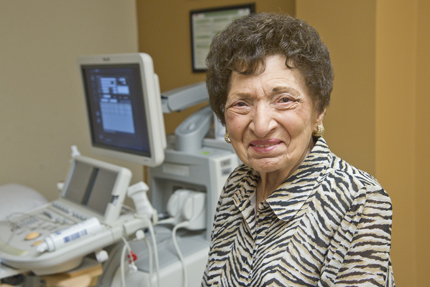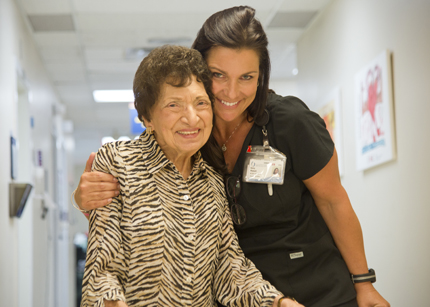Patient makes UMMC history as oldest TAVR recipient

One weekend in July, Rosa Fertitta cooked up a cake, brownies, two pies and garden-fresh vegetables.
Not a bad run in the kitchen for a 94-year-old. It's even more significant for a 94-year-old who, six weeks earlier, underwent heart surgery to improve her quality of life and give her more time and energy to enjoy the people and things she loves.
“I was worried about it being a risky business,” Fertitta said of her June 15 transcatheter aortic valve replacement, known as TAVR, at UMMC. “I'm lucky to be alive. Evidently, God did not want me. They say I'm too mean to die.”
In February, Fertitta traveled from her Shreveport, Louisiana, home to Brandon to visit her niece, Ginger Plauche.
“She's been like a second mother to me,” said Plauche, whose own mother - Fertitta's sister -- died less than two years ago.
Plauche said she could tell Fertitta, who had heart bypass more than 20 years ago, was struggling to breathe. She brought her aunt to UMMC to see Dr. Douglas Wolfe, professor of cardiology. Fertitta learned she had aortic valve stenosis, a form of heart disease in which the valve that regulates blood flow from the heart doesn't fully open, causing the patient to be short of breath and fatigued.
That didn't jibe with Fertitta's lifestyle of just months before.
“I exercised two hours a day, every other day, for 20 years,” she said. “I'd come home and be so full of energy that I'd walk the dog around the block.
“In the spring, I like to go out and put my hands in the dirt. I grow a lot of herbs - sweet basil, parsley, rosemary, mint. I've got mint coming out my ears.”
Her weakening heart put the brakes on her ability to drive, to garden, to play cards with her canasta group, to cook - and to do the aerobics that she so loved.
“We had to think about it,” Plauche said of the surgery. “But she could hardly walk across the room. We had to do something.”
Wolfe sent Fertitta to see Dr. John Parks, assistant professor of cardiology. Parks, Dr. Giorgio Aru, professor of cardiothoracic surgery, and Dr. Larry Creswell, associate professor of cardiothoracic surgery, decided TAVR was Fertitta's best option because she would have been at high risk to recover from traditional open-heart surgery.
“She adores him,” Plauche said of her aunt's affection for Parks. “He was so kind and compassionate. He explained everything, and he didn't put any pressure on her to make a decision.”
The procedure was performed by the team of Parks, Creswell and Dr. Cameron Guild, associate professor of cardiology. Instead of making an incision in Fertitta's chest to replace her faulty valve, her heart valve team used a minimally invasive approach. A catheter about the size of a pen was inserted into the artery in her leg and carefully passed up into her heart.
A new artificial valve was gently compressed over a balloon device at the end of the catheter. When the balloon was inflated, the new valve expanded within the faulty valve, immediately improving blood circulation to Fertitta's body. Fertitta became the Medical Center's oldest TAVR patient.
Why would Fertitta be a candidate for heart surgery at 94?
“We try not to look at just age, but take in the whole patient when we are evaluating people for valve replacement,” Parks said. “She was very functional and active before her heart valve disease really impacted her lifestyle.”
Genes could be on her side, too. Fertitta's mother died at 93, and her father “lived to be 99 and six months,” said Fertitta, a widow with no children who dotes on Plauche and the rest of her family.
“The whole team worked as a family,” Plauche said of her aunt's caregivers. “They made us feel very well taken care of.”

Kristy Womack gives Fertitta a friendly hug
That includes Kristy Womack, the registered nurse care coordinator for the adult valve program.
“She on her own came up to rehab on a Sunday and brought blueberry muffins that she knows my aunt loves,” Plauche said.
Today, Fertitta is happily easing back into an exercise routine.
“I feel fair. Nothing like I used to, but my breathing is much, much better.”
“She's walking a lot better, and she takes her three-wheel walker with her wherever she goes,” Plauche said.
At Fertitta's first check-up appointment after surgery, her caregivers gave her an ultrasound and checked her weight - on the rebound at 121.
“That was my weight in my high school days. It didn't stay there long,” she joked.
Parks told her that her heart function is strong.
“It's your fighting spirit. You did great,” he said.
Plauche and Fertitta said they want other seniors who qualify to consider having the surgery.
“It was a breeze for her,” Plauche said.
Fertitta is reuniting with her canasta card group.
“She reads the newspaper front and back,” Plauche said. “She keeps her mind going. She really wants to be in an exercise class.”
Fertitta's vices are few.
“I never smoke, and I never drink,” she said. “I drink socially, of course, but that's not real often.”
“She is a very sweet person,” Parks said. “She's got a lot of faith, which has helped sustain her through this. Even when she was recovering from her procedure, she was always smiling when you went into her room.
“Despite this being a less-invasive procedure than traditional heart surgery, she will need time to heal. But she is already regaining her quality of life, and that's what we really like to hear.”


